Kavita Srivastava Interview
India’s government unleashing controversial Unlawful Activities Prevention Act as means of silencing civil rights activists
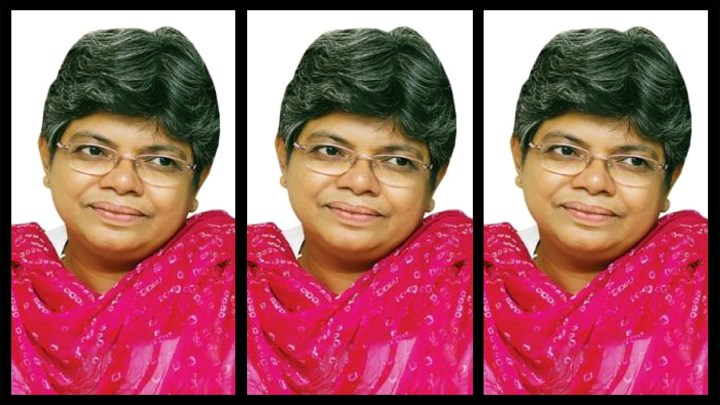
In December 2020 Indian Prime Minister Narendra Modi was one of the leaders invited to Joe Biden’s Summit on democracy. This was despite the fact that in India, Modi and his government are systematically snuffing out all opposition to their rule and arresting and imprisoning activists without bail or basic rights.
In this interview, Anandaroop Sen, a senior lecturer in history at the University of Cape Town, talks to Kavita Srivastava, the President of the Rajasthan Chapter of the People’s Union for Civil Liberties and one of India’s most respected activists, about the clampdown and what it represents for the future of human rights in India.
Anandaroop Sen (AS): Could you begin by giving the context in which the 16 Indian academics, activists, lawyers, popularly known as the Bhima Koregaon 16 (BK 16) have been imprisoned by the Narendra Modi-led BJP government for the last three years. Perhaps you could briefly give us a timeline of the events.
Kavita Srivastava (KS): This is a long story. It has been three and a half years since the first of the Bhima Koregaon activists were imprisoned. On New Year of 2018 in the city of Pune, in Maharashtra, at the Shaniwar Wada — a huge meeting ground — about 100,000 people gathered to commemorate 200 years of a military victory of the Mahar regiment, defeating the Peshwas (the most oppressive caste Hindu rulers of Western India in the 18th century). The battle was won at the village Bhima Koregaon, about 30kms from Pune.

It has been three and a half years since the first of the Bhima Koregaon activists were imprisoned. (Photo: free-them-all.net)
The Mahars are an ‘untouchable’ caste or scheduled caste as they are known now.
They were identified by the British as a martial caste and fought in the British Indian army.
Dr Bhimrao Ambedkar, also a Mahar, the emancipator of Dalits, the oppressed and the repressed classes, in 1918 — the hundredth year of the victory — initiated a commemoration assembly around this military triumph, and a memorial was installed. It was a big political moment in Dalit history, something that celebrated a victory of the ‘untouchables’ over the castes of Hindus.
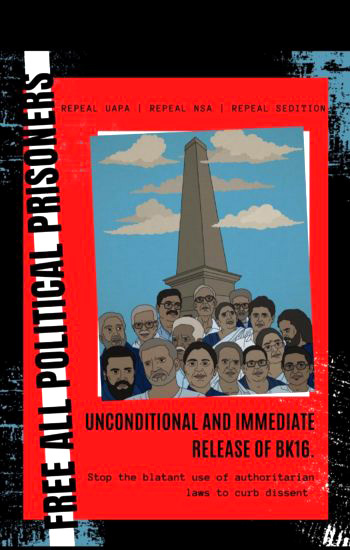
(Photo: free-them-all.net)
As you can imagine, it carried and still carries a lot of symbolic weight in Dalit histories.
1st January 2018 was the 200th anniversary of this. On the eve of it, 250 organisations came together from a cross-section of women’s groups, workers groups, Dalit groups and other social and cultural organisations. It was a massive congregation of people who decided not only to celebrate the history of Dalits but also create another forum to fight the new oppression and fascism that is taking over India.
It was organised under the leadership of retired Justice P B Sawant, of the Supreme Court of India and Justice Kolse Patil, retired Justice of the Bombay High Court.
This congregation was called the “Elgar Parishad”, a loud call inviting all. There were strong speeches against the present ruling dispensation of the Bharatiya Janata Party (BJP), a Hindu Majoritarian party, with a lot of music, singing, poetry.
The next day, thousands and thousands of people moved towards Bhima Koregaon to pay their respects. This congregation was attacked. It was a very organised assault by the Hindutva forces. One person died, several shops were burned; buses were burned. Subsequently, a First Investigation Report (FIR) was lodged to investigate the violence.
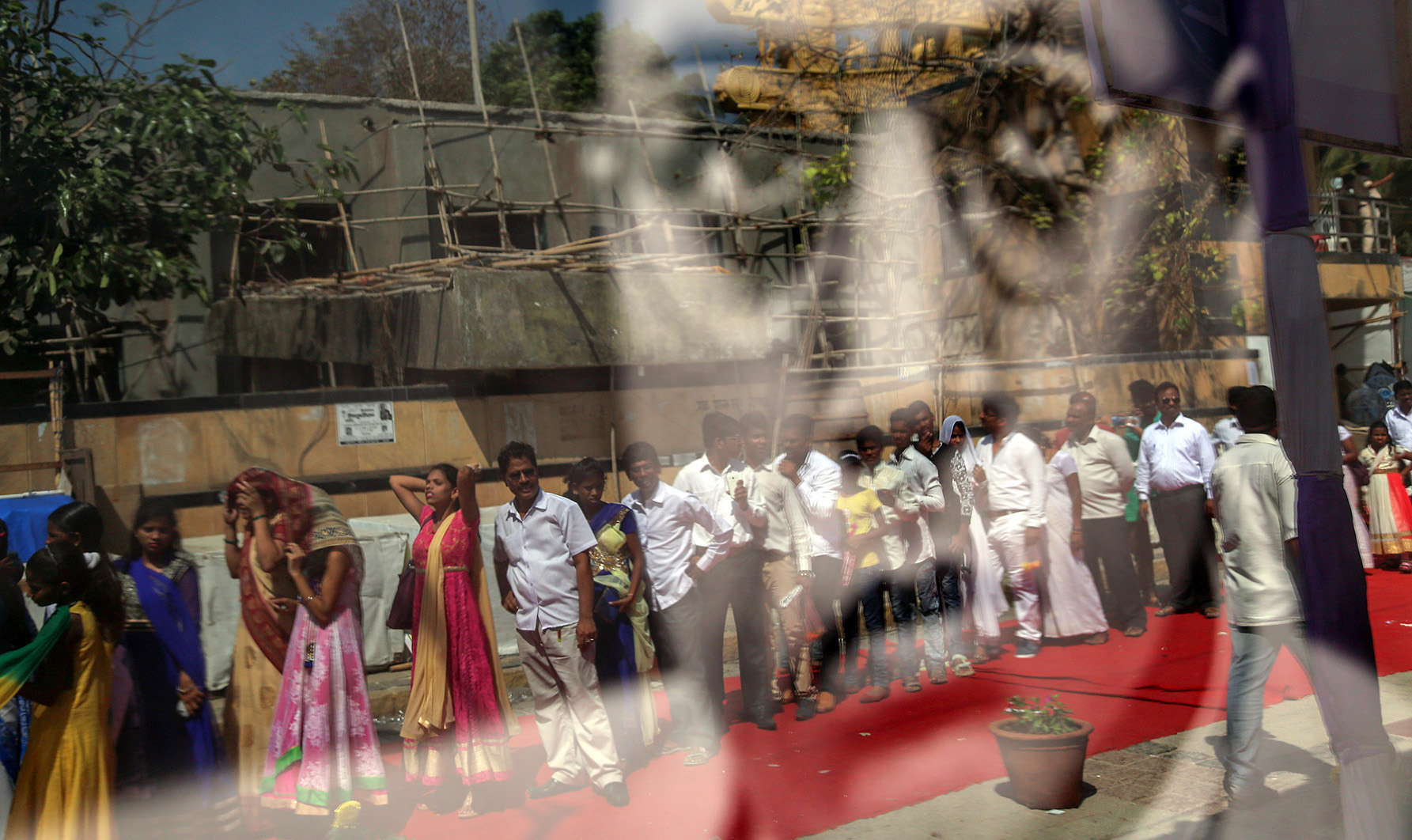
Indians reflects on the photo frames of Dr. Bhimrao Ambedkar at the Chaitya Bhoomi, a memorial of Dr. Bhimrao Ambedkar, on his 125th birth anniversary in Mumbai, India, 14 April 2016. Bhimrao Ramji Ambedkar, also known as the ‘Father of the Indian Constitution’ was an Indian jurist, political leader, and was the Chairman of the Drafting Committee of the Indian Constitution. (Photo: EPA/DIVYAKANT SOLANKI)
The Pune police investigating the FIR identified two people. Both are leading right-wing Hindu fundamentalist organisations. They have a history of provoking severe violence. But a few days later, after the report was lodged, the investigation track changed, claiming that some Maoists had organised this meeting and provoked the whole thing.
Interestingly, a second FIR was lodged on 8th January 2018 and the whole story changes.
Suddenly you see something else happen and investigations begin against people who are lawyers, like Surendra Gadling, one of the foremost lawyers who represent a lot of Dalits and other oppressed people. He regularly represents people in the High Court in the Nagpur Bench of the Bombay high court.
His house was raided, his computer was taken away.
Then on 5th June they arrest five people, one of whom was Rona Wilson. Rona Wilson is a Delhi-based, former journalism student who was trying to return to academia and was planning to go abroad for some studies. He was also one of the signatories of the Committee for the Release of Political Prisoners. He was one of the key founder members.
His house was raided, his computer taken away and he was arrested.
On 5th June, Dr Shoma Sen, a professor at Nagpur University, was also arrested and her house raided. Mahesh Raut who lives in Gadchiroli, a very young activist, was the Prime Minister’s Research Fellow, a very prestigious research fellowship, he’s arrested. So is Sudhir Dhawale, one of the key persons who organised the congregation and he’s a renowned cultural artist of Maharashtra.
Soon after that, we saw a campaign begin on television against Sudha Bharadwaj, a renowned lawyer; they were trying to show a link between Sudha and other people who were arrested and with a cock and bull story of how these people wanted to assassinate the Prime Minister.
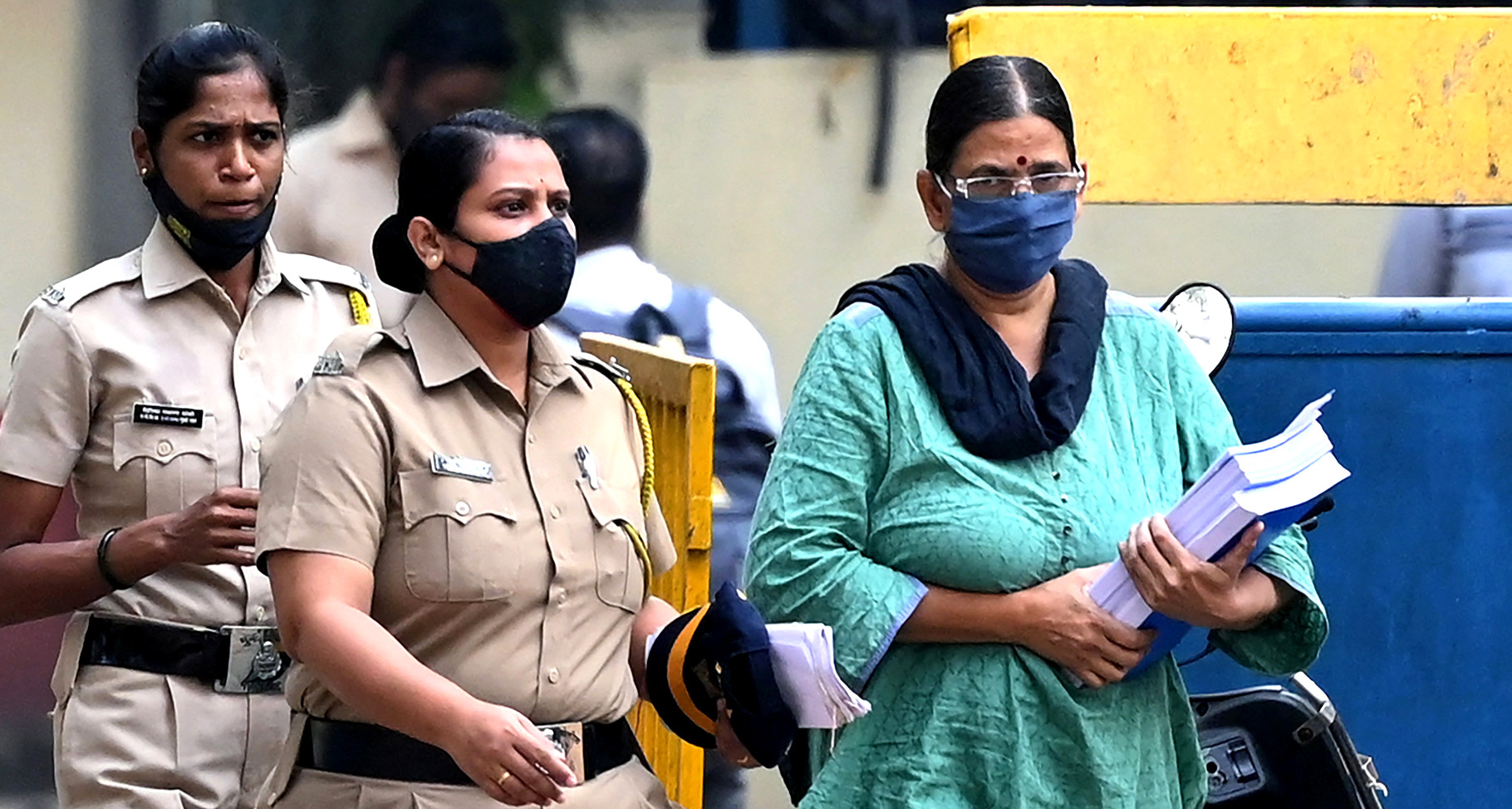
Police escort activist and lawyer Sudha Bharadwaj, right, towards a van as she leaves jail to appear in a special court ahead of her release on bail on the 2018 Bhima Koregaon case in Mumbai on December 8, 2021. (Photo by Punit PARANJPE / AFP)
On 28th August, the Pune police orchestrated raids in ten places in the country and five people got arrested. Sudha Bharadwaj, who was living in a suburb of Delhi, was one of them.
Gautam Navlakha, an intellectual who has worked in Kashmir, who has written extensively on state atrocities and Maoists, was raided and arrested.
Vernon Gonsalves, a trade unionist in Bombay, a very well-known lawyer, is arrested. Then Varavara Rao, one of the finest revolutionary artists in India, is arrested and Arun Ferreira — a writer and an organiser of workers — was also arrested.
These arrests happened under the terror law called the Unlawful Activities Prevention Act (UAPA).
Two years later Anand Teltumbde a well-known Dalit academic is arrested. And Professor Hany Babu, a linguist, teaching in Delhi University is also arrested. Sagar Gorkhe, Ramesh Gaichor and Jyoti Jagtap, three people from the Kabir Kala Manch cultural group working amongst Dalits, were arrested.
The last arrest that happened in 2020 was of the 82-year-old priest Father Stanislaus Lourduswamy, popularly known as Father Stan, who worked all his life amongst the Adivasis, the Tribals, in the State of Jharkhand in Eastern India

Human rights activists hold placards during a silent protest in solidarity with Jesuit priest and activist Stan Swamy, in Bangalore, India 07 July 2021. The passing of 84-year-old Jesuit priest and activist Stan Swamy, detained nine months ago under a counter-terrorism law in a controversial case, has sparked a wave of outrage in India and abroad. (Photo: EPA-EFE/JAGADEESH NV)
Now the six became 16 and all of them are booked under the terror law.
What was interesting was the age range of the arrested individuals: from the early 30s, Jyoti Jagtap of Kabir Kala Manch, to Father Stan Swamy who was in his 80s. Father Stan when he was arrested, was 82, Varavara Rao was 79, now 82. Of the 16, seven of them were senior citizens and several of them were sick when they were arrested.
AS: Thank you that helps to put this into context. We can already begin to see a convoluted chain of events is underway, where very different individuals who have been very vocal in criticism of the regime have been suddenly brought together under the pretext of a conspiracy.
This brings us to my next question. You mentioned UAPA as the key piece of legislation which was at the heart of the arrest of the 16. Could you tell us more about this draconian law and how the state is using this law, particularly how this has been deployed to arrest the 16 people?
KS: Actually this law has become a tool to just throw people in prison. The trial of those arrested has bulky charge sheets which run to 30,000 pages. But then they continue doing arrests so that the trial never starts.
Now all these 16 people are caught in the ‘conspiracy’ of attacking India’s integrity and security. Yet no attack happened. Nothing happened.
When they went into court, they said initially that all these people wanted to assassinate the Prime Minister and create chaos in the country, as witnessed in Bhima Koregaon. But when the charge sheet comes there’s nothing of that. There’s no mention of the assassination of the Prime Minister.
Then the story changes.
Basically, they’re trying to say that the arrested individuals want to destabilise the government. So, from assassination to anarchy. And therefore, they’re invoking these terror laws and they’re trying to also say that they’re funded internationally by armed groups.
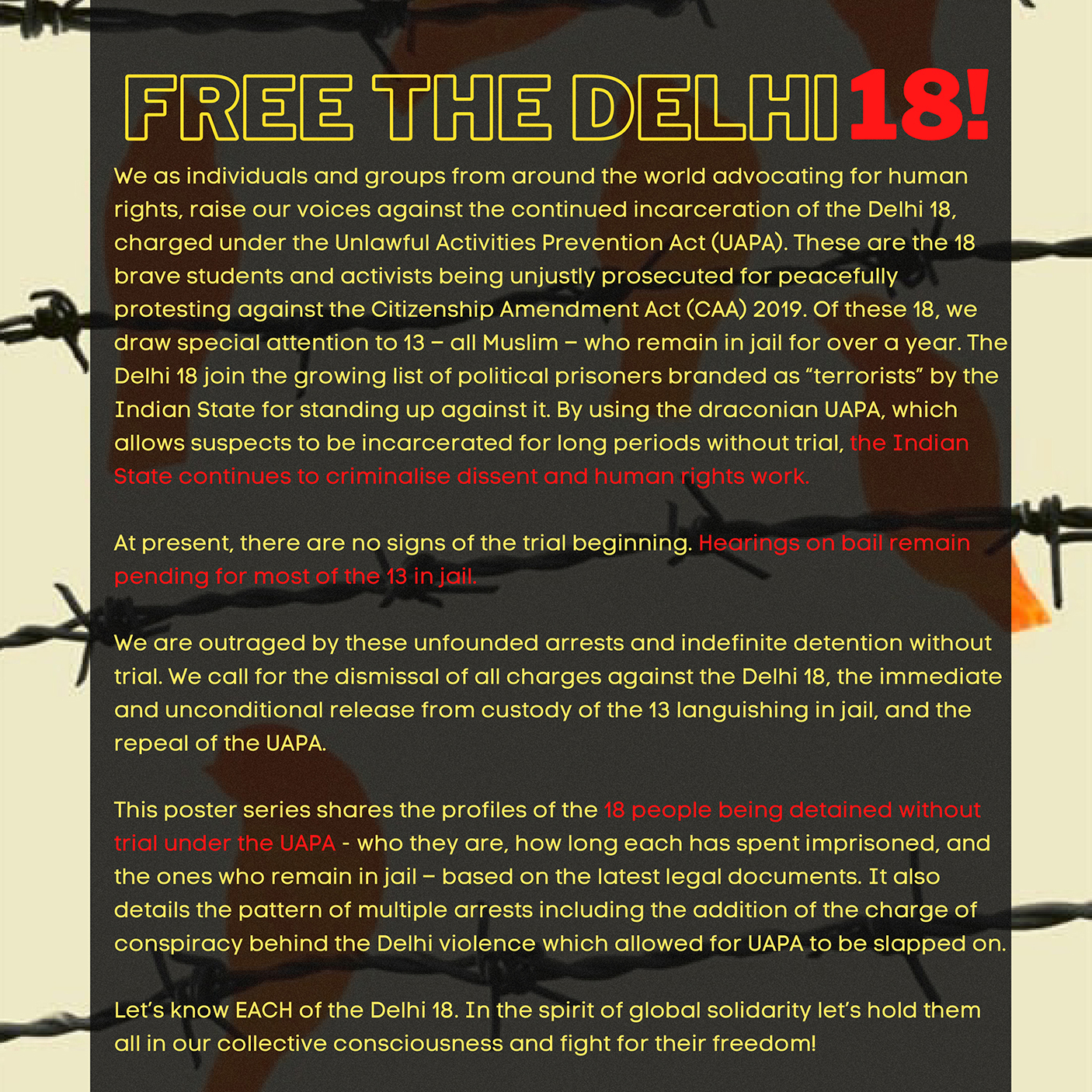
(Poster: The World is Watching India)
Being booked under UAPA is different from if you are booked under the Indian penal code. Under the Indian penal code sooner or later you’ll get bail. There may be charges against you, there may be false cases against you, but at least it’s a civil liberty that can be restored by a court of law. However, in the case of UAPA, the Supreme Court in 2018 said that if there’s even one document against the person in the investigation then they won’t grant the person bail.
Bail is normally given; irrespective of the charges against you and the merits of the case, what they did or not do, the main thing about bail is that you will not run away, you will not damage the evidence, you will not threaten the witnesses. If the court is satisfied on these grounds, you are granted bail.
But in UAPA they changed that. Even if there’s one document against you on the charge sheet, you won’t be granted bail. This means a decision is taken against me, based maybe on planted evidence that I have not seen because a charge sheet has not been served against me. Secondly, I may not get a chance to argue that I’m innocent.
All these people, people who were critiquing the state, like me, all of my colleagues, it’s our duty to make the government accountable. It’s our duty to critique policy, to critique law, to critique the actions of the government, to critique the programme and to do it democratically, peacefully as lawfully as defined by the constitution. Those arrested were also the best in their field doing this job.
So, what is very worrying is that if you’re a dissenter in India and trying to make the government accountable, taking advantage of your absolute rights to democratic expression, even though you’re going through legal channels and you’re complying with the rule of law the law is shifted, and your actions are made as something that is a threat to the sovereignty of the nation. You are labelled as a terrorist as if you are about to commit terror, your normal democratic work is given that shade.
Under the UAPA this is what happens to you; you don’t get bail or at best it’s extremely difficult to secure bail.
AS: In addition to the expansive remit of UAPA there is now the issue of technology and surveillance. Critics of the Indian state have commented on how many of the detained individuals had their accounts hacked and evidence planted in their laptops through malware, particularly like the Pegasus spyware designed by the Israeli company NSO. As an activist how do you deal with this kind of threat?
KS: In this case, they tried to present everybody as front-liners of the Maoist organisation. They claimed that the People’s Union for Democratic Rights (PUDR) and People’s Union for Civil Liberties (PUCL) is a ‘frontal organisation’.
And what is a ‘frontal organisation’? There is no definition in the UAPA.
Coming to your question about the planting of evidence: Absolutely. That makes this case even more challenging because NetWire was used to plant data in the computers. It’s very clear.
Rona Wilson’s hard drive was analysed by Arsenal Consultancy, one of the world’s foremost digital forensics companies. According to them, they’ve never come across a case like this yet. Not only were the files created in the planted evidence, but files also got created because they kept planting evidence and then they took it away as well.
And Pegasus spyware was used in the surveillance on a lot of mobiles. We know that in our country the latest expose that was done by The Wire (in collaboration with many other news organisations) showed more than 150 individuals were targeted.
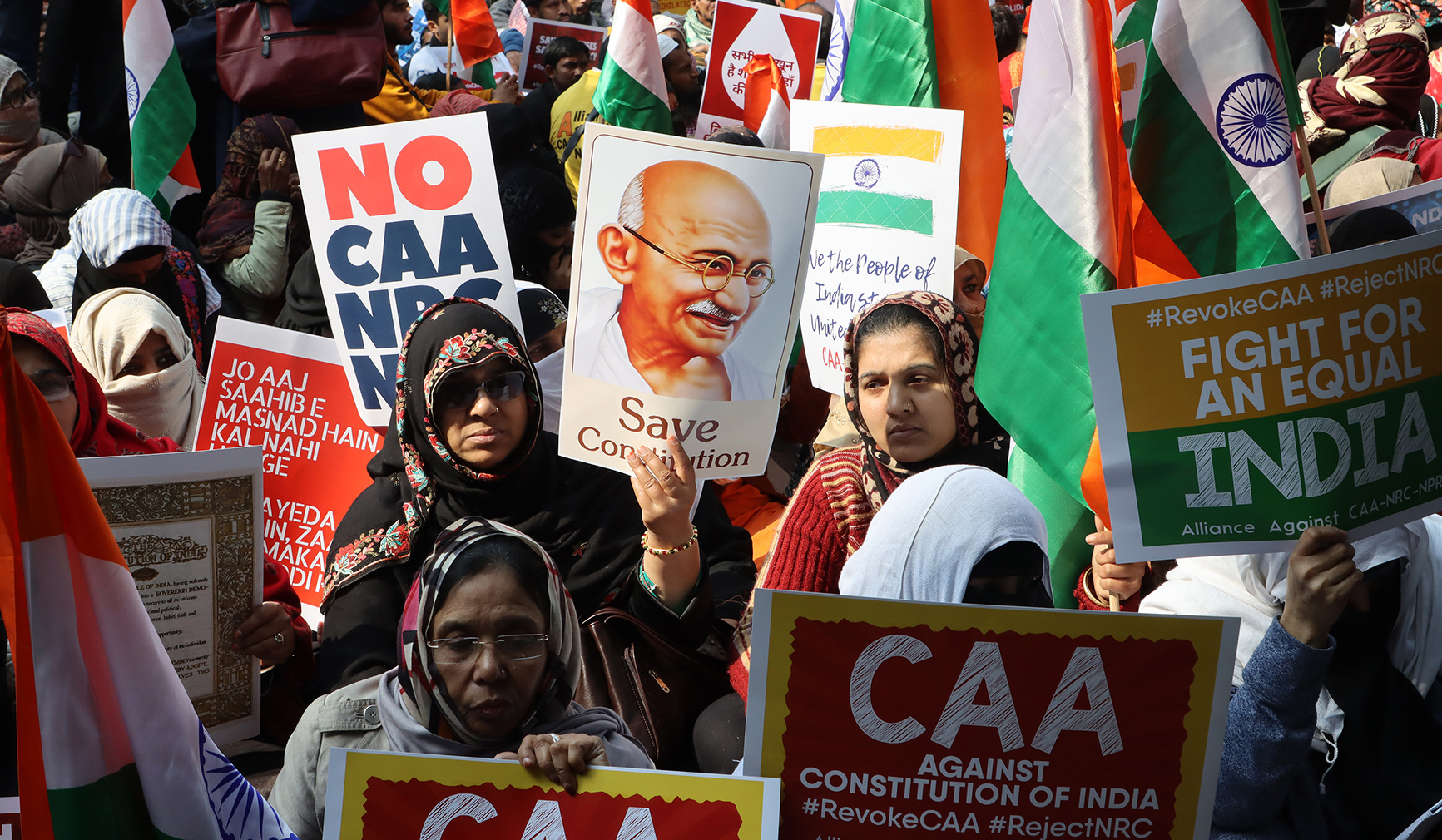
Demonstrators hold up flags and placards while gathering to protest against the Citizen Amendment Act at Jantar Mantar in New Delhi, India, on Wednesday, Jan. 29, 2020. Protesters say the law undermines India’s Constitution, which treats all religions equally. They fear it will be misused, together with a proposed National Citizens Register, to disenfranchise poor Muslims who lack the documents to prove their residency. (Photo: T.Narayan/Bloomberg via Getty)
All the Bhima Koregaon accused had Pegasus in their devices. This means we cannot trust electronic ‘evidence’. So, it raises major questions regarding the presentation of incriminating evidence. That’s a major challenge. How can any trial proceed on evidence that is created? And how many years will it take to make the courts believe the innocence of those arrested? And will any court of law take action against those who have done this malicious act?
India is becoming a surveillance state, absolutely. There is surveillance of just about everything in this country today. These activists were targeted but this is continuously happening, and we don’t even know. These 16 people who have been thrown behind bars are victims of this rubbish data that has been created.
AS: As shocking as the formal remit of the UAPA, the spyware, the malware, the electronic surveillance, there also appears to be an element of a very petty vendetta that the state has. This is clear from how the prisoners have been treated as individuals. Especially the older prisoners, Father Stan Swamy died of Covid. If you could just tell us a little bit more about that? Along with the larger formal structures of surveillance and law, there seems to be a concerted effort to dehumanise the prisoners.
KS: Yes, any way you look at it it’s frightening.
All these people got arrested in the middle of Covid in 2020, For instance, Gautam Navlakha whose remand was cancelled in 2018 after his arrest in August, was rearrested along with Anand Teltumbde, Father Stan all in the middle of the lethal Covid wave of 2020.
What was the situation of quarantine in prison? Gautam wrote a letter saying 300 people with just two bathrooms in a school was a quarantine area. Father Stan, who had Parkinson’s disease, needed a sipper to drink water, to drink tea, which he was denied.
Gautam Navlakha was refused his glasses.
Father Stan could not only not eat on his own, but he also needed the help of one co-prisoner to bathe him. And yet they kept him. They just wouldn’t grant bail.
Dr Varavara Rao also got Covid. Hany Babu, also got Covid and a terrible fungal infection which reached his eyes. Several of the 16 got Covid and that’s how Father Stan died. He repeatedly told the Bombay high court to grant him interim bail so that he could go and die amidst his people in Jharkhand. He was unwell but said that these hospital trips back and forth are an eyewash, basically, they are done as tokenism to tell the court that there is no illness and all is well with the person. He refused to be subjected to this indignity. But his condition deteriorated a few days later and he had to be rushed to hospital, where it was confirmed that he was positive for Covid-19, something that the hospital authorities ignored. The tragedy is that he could never recover and died in less than six weeks in hospital. If this was not an institutional murder, then what else would we call it. He should never have been arrested in the first place or if arrested, released on bail.
The whole agenda is just to somehow shun you, to treat you with indignity. That’s violating the jail manual. Suppose I’m treated badly in any Indian jail. I can move to court but if arrested under UAPA it becomes difficult as the courts keep listening to the investigating agencies, in this case, the National Investigating Agency, whose credentials as an independent, objective agency are completely suspect.
Something very interesting happened back in 2019 when there was a change of government in Maharashtra. The Maharashtra Chief Minister and one of the most senior leaders of Indian Politics presently, Sharad Pawar, one of the alliance partners, decided to constitute a committee to review the cases. The National Investigation Agency (NIA), a very notorious central agency, came in and took over the case. Until then only nine people were arrested, they finally arrested 16 people according to the NIA law, trying them against federalism.
They just walked in and took the case from the state of Maharashtra. And the NIA court would just not listen.
So, the pettiness duly extended right from the jail authorities to the NIA. When you are in jail what is it that you lose? You cannot lose your right to life, to dignity, you cannot lose your right to health and health care. The only thing that you lose is your right to movement. Yet, in Indian jails, the way UAPA prisoners are thrown in is as if they don’t exist. It’s as if now they’re going to be totally under siege from the Indian state — everything is under attack, their mind, their body, how they will exist.
Dr Varavara Rao was granted medical bail in January of 2021, as his medical condition was really bad. He needed better health care, which the hospital could not have provided. So he was granted medical bail with the condition that he could not go back home to Hyderabad but had to stay in Mumbai. The NIA is trying its best to send him back to jail, but the courts have asked for more reports showing his well being.
The loss of Father Stan is so unfortunate. I wish he had been granted medical bail. The right to health care and to dignity cannot be denied, even of a prisoner.
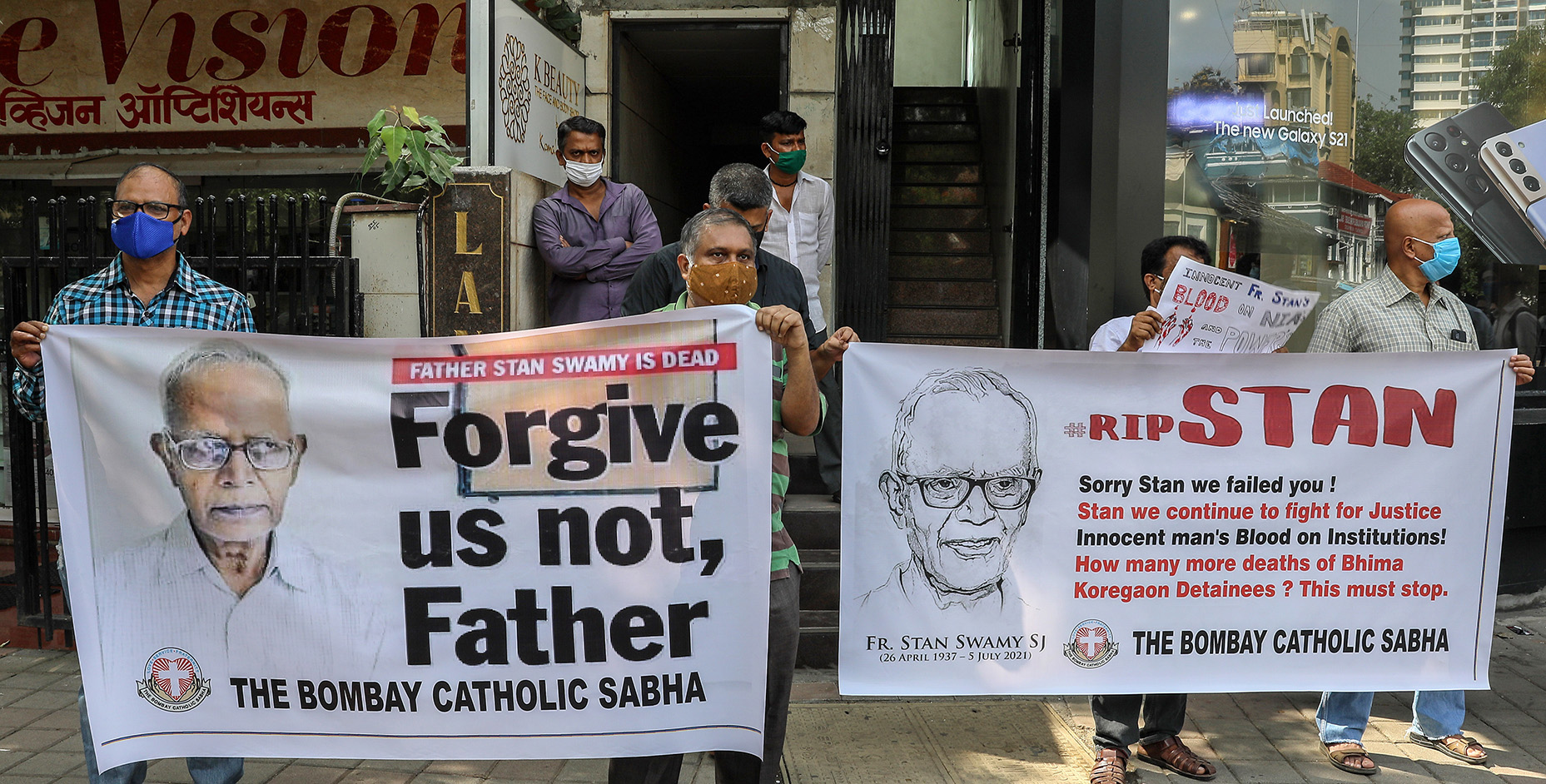
People hold candles posters during a prayer meeting for Father Stan Swamy outside a church in Mumbai, India, 06 July 2021. The passing of 84-year-old Jesuit priest and activist Stan Swamy, detained nine months ago under a counter-terrorism law in a controversial case, has sparked a wave of outrage in India and abroad. (Photo: EPA-EFE/DIVYAKANT SOLANKI)
One of the most wonderful almost impossible turns that this case has taken is the grant of bail to Sudha Bharadwaj on technical grounds. This happened on December 1st, 2021. The Supreme Court of India also dismissed the appeal that the National Investigating Agency had filed to reverse the bail. Sudha was out on the 8th of December, 2021, under stringent bail conditions of not leaving the city of Mumbai, not allowed to discuss or meet co-prisoners, not inviting people home in large numbers and the rest. But at least she is out, her freedom restored, she can breathe fresh air, speak freely, be with her daughter and friends.
AS: You have been a civil rights activist for decades now. You have seen and fought against previous regimes. What do you think is specific to this moment in India about this BJP government?
KS: I think we are living in a state of undeclared emergency. We are supposed to be living in a state which is governed by the constitution. Sometimes I feel that we are hardly a secular state but increasingly a theocratic State, with the way the Muslim and Christian minorities are being treated. With lynchings of Muslims and abuse and hate all over the social media, including the sexualisation of hate and the increasing attacks on Muslim women on social media, the criminalisation of Muslims and Christians, India on the eve of its 72nd Republic Day, is on the road to becoming an authoritarian state, a fascist state.
We are living in a state where every institutional mechanism is being subverted to deny any other voice than the narrative of the dispensation of those who are in power. In the parliament, the opposition is not given an opportunity to speak. People are critiquing the government and you challenge its narrative, then a Bhima Koregaon happens, and people are sent to jail.
We have no privacy. I have no right to privacy under the law. The Supreme Court has laid down the right to privacy. How dare Twitter hand over my browsing history and my IP address? To any investigating agency? Yet under Indian law, Twitter is bound to hand over everything in 72 hours unless the court of law forbids it. But they are obligated.
So, these are the laws. There’s complete control over social media, there’s no other voice being allowed in parliament.
On the streets when you come out, you get arrested.
For example, a law was pushed down in parliament on 10th December 2019, on Human Rights Day, where for the first time ever grounds of religion was introduced in the granting of Citizenship. It is called the Citizenship Amendment Act (CAA-2019). It was basically a law to disenfranchise the Muslims.
Large protests, led by women, took off all over the country. Called the anti-CAA protest. In Delhi, there was a hate campaign by the BJP in the run-up to the State Assembly elections of 2020. The fallout was an attack on Muslims. Extremely unfortunate that 52 people died who were mostly Muslims. It is important to state here that every life matters, so all the deaths were unnecessary and should not have happened, whether of the Hindus or Muslims.

Bhim Army chief Chandrashekhar Azad along with Bhim Army and Indian Muslim activists holds a copy of Indian Constitution during a protest against the Citizenship Amendment Act 2019 (CAA) outside Jama Mosque, in New Delhi, India, 17 January 2020. According to news reports, Chandrashekhar Azad joined the protesters after getting bail from the court, defying court orders of not to join anti-CAA protest. CAA will give Indian citizenship rights to refugees from Hindu, Jain, Buddhist, Sikhs, Parsi or Christian communities coming from Afghanistan, Bangladesh and Pakistan. (Photo: EPA-EFE/STR)
In Delhi, in the name of a threat to India’s sovereignty and security, they arrested 21 people under the UAPA. All young people, in their 20s and 30s, except for two. The indiscriminate use was again of all those who were leading the 25 protest sites in Delhi against the CAA. The charges, as in the Bhima Koregaon, were again the conspiracy to overthrow the government. All are in jail except for the three people who got bail. The charge sheet runs into more than 30,000 pages.
And it goes on and on and on.
So, at the moment, we are very much in a state of undeclared emergency. A state where the institutions have been seized.
In a democracy, the institutions keep working independently of the authoritarian state, so the rule of law continues and the process of subversion is diminished. But here every institution has been hijacked. The media has become a propaganda machine. Not just the state media but the private media is playing to the tune of the ruling dispensation.
Things are getting worse and worse. There is a lot of fear in the activist community because every tool has been used to browbeat us. If you’re an NGO there’s another formula, if you’re an activist there’s another formula, in the name of money laundering you can be arrested, especially, if you are receiving foreign funds. If you’re a lawyer there’s another formula, if you’re a media person there’s another formula.
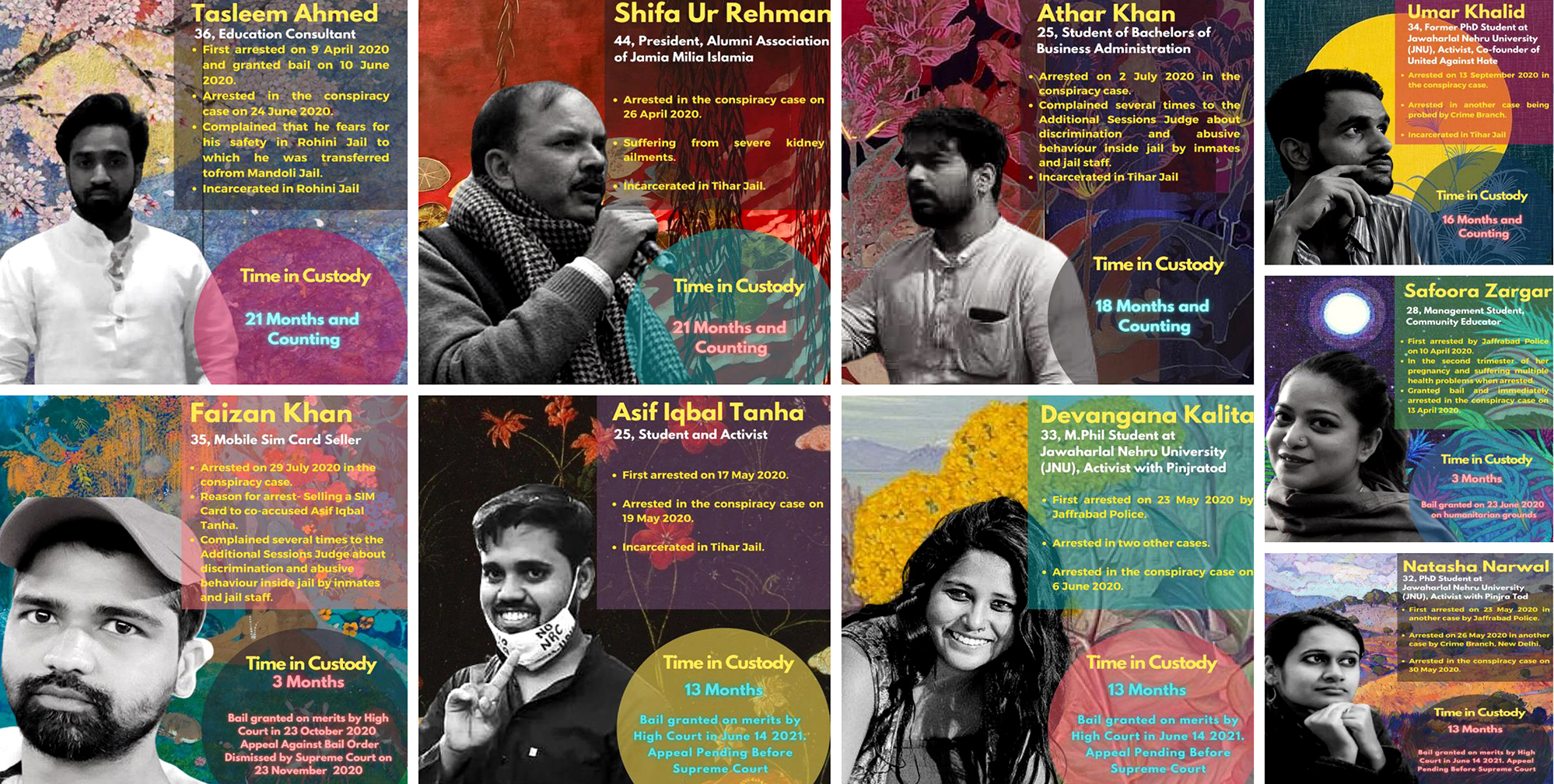
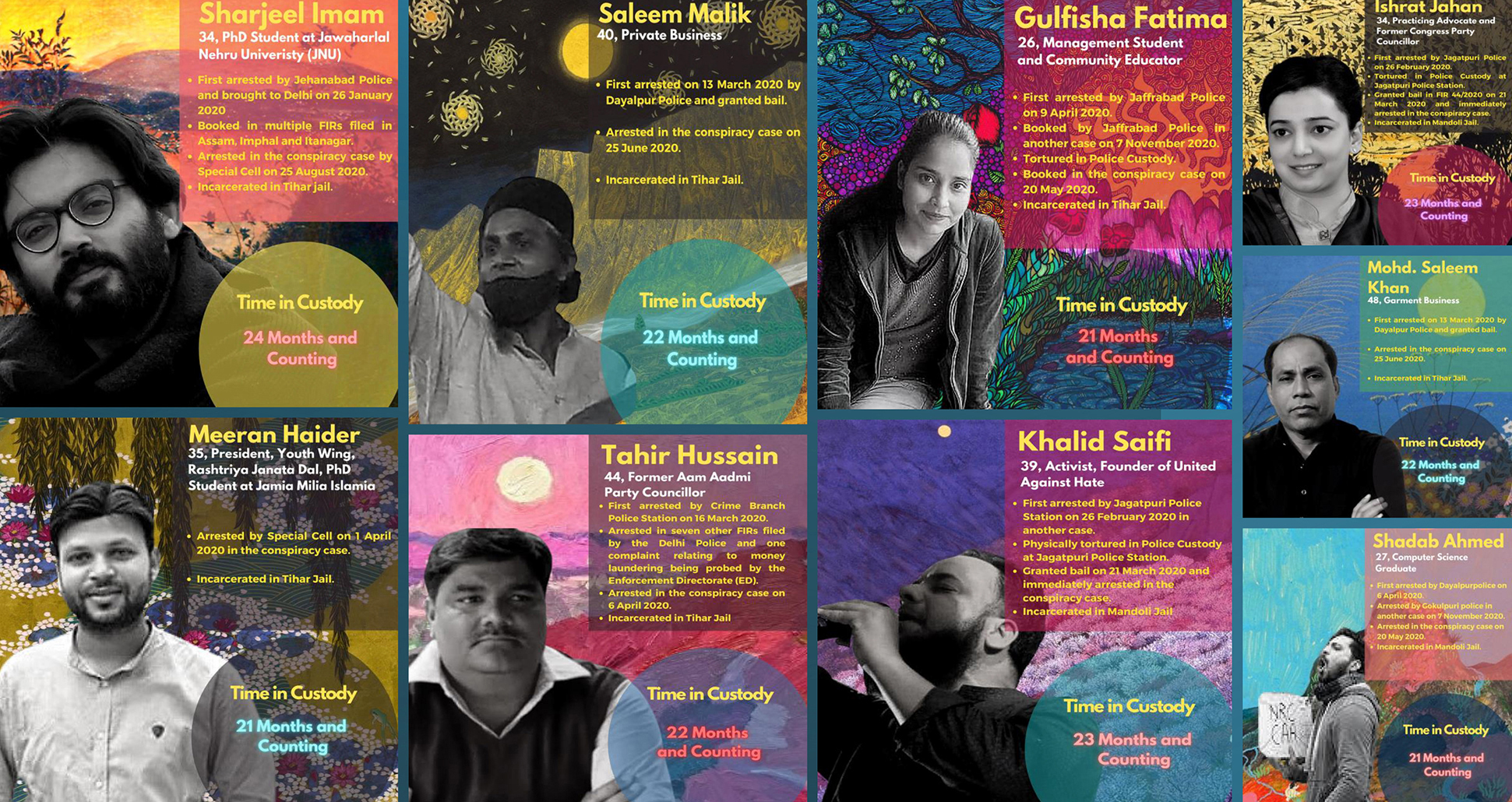
Global demand to free the Delhi 18. (Posters: The World is Watching India)
But hope is not over. Not all of India’s courts are subverted. We must keep going back to the Indian courts. Though we realise that they also don’t all have a kind of independence. In the end, it is the people of India who have to fight it. The Hindu majority who seem to have given the consensus to build a Hindu Rashtra, has to realise. And collectively we have to fight back against this complete subversion of the Indian Constitution and rebuild on the principles of fraternity, dignity, liberty, equality and restore democracy and a democratic way of life. DM/MC
Kavita Srivastava is a human rights worker and a feminist. She is the national secretary of the People’s Union for Civil Liberties, one of the oldest human rights organisations in the country. Her public life started in the mid-80s working with rural women towards their empowerment in Rajasthan. Since then she has spent 35 years trying to work collectively and through non-violent means in order to ensure justice to survivors of systemic violence due to their gender, class, caste, religious group or nationality. She has exposed state terror and violations of the rights of Human Rights Defenders. She continues to work for peace, including the release of prisoners on either side of the Indian and Pakistan border. She was part of a team in the longest right to food litigation in the world in the Supreme Court of India, (from 2001 to 2016) ensuring the right to food for all and with over 100 orders on various entitlements provisioning food for all ages. This led to the genesis of the National Food Security Act. She was responsible for the Vishakha Judgement, ensuring a sexual harassment-free workplace for women, collectively with other feminists’ legal practitioners and women’s movement people.



















 Become an Insider
Become an Insider
Comments - Please login in order to comment.